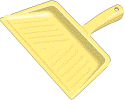Pesach Cleaning Primer
Rabbi Becher is a Senior Lecture for Gateways Organization and the author of the best-selling Gateway to Judaism
The following instructions are by no means a complete halachic guide for Pesach. A Rabbi should be consulted for any questions and doubts that arise, and refer to the many books available that present the halachot in detail. The following instructions are based on classes given by Rav Chaim Pinchas Scheinberg, shlita.
- All places or articles into which chametz (leavened grain products, eg. bread, crackers, cake) is usually brought during the year must be cleansed and checked for chametz before the evening preceding the seder. The search for chametz (details of which can be found in the Haggadah) is started at nightfall on the evening preceding the seder.
- Any article or place which is not used on Pesach, which is closed up and sold, does not need to be checked for chametz.
- Chametz which has been rendered inedible (even to an animal) by being soaked in a foul-tasting liquid such as detergent, "Draino", bleach or ammonia is not considered chametz.
- There is no obligation to check and destroy chametz that is less than the size of an olive (approx. 30 grams) and is so dirty that a person would not eat it.
- Surfaces, closets and cracks where it is possible that chametz has entered should be washed, ensuring that detergent enters all cracks and crevices.
- Kashering for Pesach is done in the same way as during the year
- It is customary to also cover any surfaces that have been kashered and that will be used for food, or for utensils on Pesach; eg. tables, countertops, cabinets and stovetops, with plastic, linoleum or aluminium foil.
- Any chametz that will not be consumed or destroyed before Pesach, must be sold to a Gentile before the time of prohibition of chametz (the time of the prohibition is printed in Jewish calendars and newspapers) for all of Pesach. The transaction should be performed by a Rabbi, since the laws are complex and a contract is necessary. The chametz that has been sold must be stored away until after Pesach.







